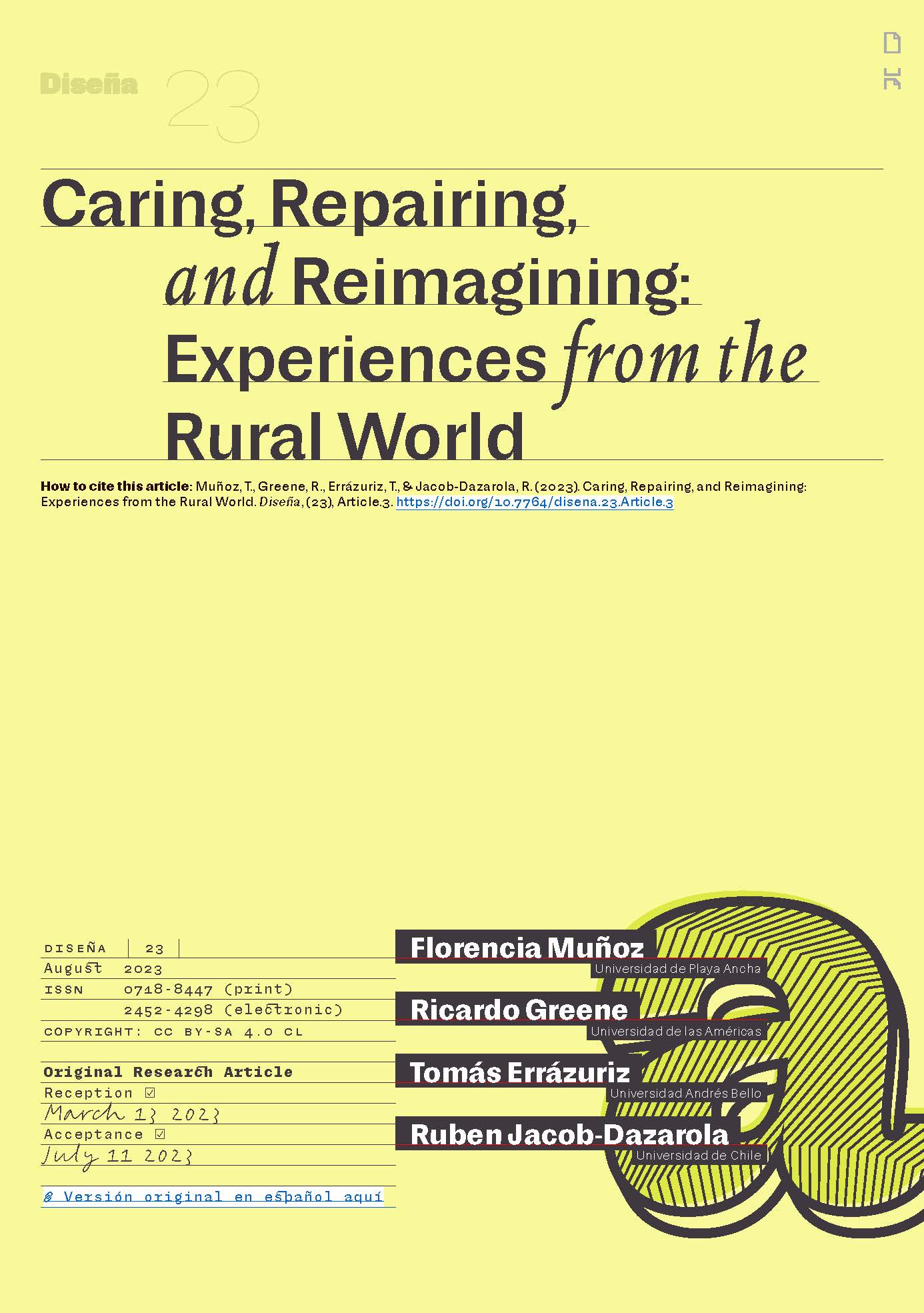Caring, Repairing, and Reimagining: Experiences from the Rural World
Main Article Content
Abstract
In the era of the Anthropocene and amidst a severe environmental crisis, part of humanity has set out to imagine new ways of addressing global warming, hyper-production of goods, and massive waste generation. Academia and public policies have placed their focus primarily on urban areas, neglecting the experiences that the rural world can offer us. Reversing this trend, this article focuses on a rural sector of the Central Valley of Chile to reveal how, through daily and ‘artisanal’ practices, it is possible to reimagine notions such as creativity, innovation, and adaptability, in the face of changing environments. Specifically, it recognizes the dynamic way in which the inhabitants of rural sectors comprehend objects and the environment; their particular way of living space and time within the local geography; and the role that their tools, technologies, practices, and knowledge play in the daily production of their homes.
Downloads
Article Details

This work is licensed under a Creative Commons Attribution-ShareAlike 4.0 International License.

This work is licensed under a Creative Commons Attribution-ShareAlike 4.0 International license.
COPYRIGHT NOTICE
All contents of this electronic edition are distributed under the Creative Commons license of "Attribution-ShareAlike 4.0 Internacional" (CC-BY-SA). Any total or partial reproduction of the material must mention its origin.
The rights of the published images belong to their authors, who grant to Diseña the license for its use. The management of the permits and the authorization of the publication of the images (or of any material) that contains copyright and its consequent rights of reproduction in this publication is the sole responsibility of the authors of the articles.
References
Aguilera, I., Bengoa, J., Daver, Y., Delgado, C., Mora, C., Planells, D., Silva, N., Sotomayor, J., & Valdivia, C. (2012). Valle Central: Memorias, patrimonio y terremoto en haciendas y pueblos de Chile Central. Catalonia.
Ariztia, T., Agloni, N., & Pellandini-Simányi, L. (2017). Ethical Living: Relinking Ethics and Consumption through Care in Chile and Brazil. The British Journal of Sociology, 69(2), 391–411. https://doi.org/10.1111/1468-4446.12265
Bengoa, J. (1999). Haciendas y campesinos. Sur.
Brandes, U., Stich, S., & Wender, M. (2009). Design by Use: The Everyday Metamorphosis of Things. Birkhäuser.
Cárdenas Grajales, G. I. (2010). El conocimiento tradicional y el concepto de territorio. NERA, 2 (February).
Chavarría Zemelmann, P. (2009). “De los cogollos del viento”: Los saberes de los antiguos. DIBAM.
Cooper, T. (1994). Beyond Recycling: The Longer Life Option. New Economics Foundation.
Crosby, A. W. (1988). Imperialismo ecológico: La expansión biológica de Europa, 900-1900. Crítica.
Dant, T. (2010). The Work of Repair: Gesture, Emotion and Sensual Knowledge. Sociological Research Online, 15(3), 97–118. https://doi.org/10.5153/sro.2158
Demaria, F., Schneider, F., Sekulova, F., & Martinez-Alier, J. (2013). What is Degrowth? From an Activist Slogan to a Social Movement. Environmental Values, 22(2), 191–215. https://doi.org/10.3197/096327113X13581561725194
Descola, P. (2005). Par-delà nature et culture. Gallimard.
Ellen MacArthur Foundation. (2013). Towards the Circular Economy: Economic and Business Rationale for an Accelerated Transition. Ellen MacArthur Foundation.
Errázuriz, T. (2018). Estación Terminal. La vida de las cosas en la vivienda rural. In F. Alarcón (Ed.), Vivienda rural en el valle Central (pp. 106-113). ARQ. http://www.edicionesarq.cl/2018/vivienda-rural-en-el-valle-central/
Escobar, A. (2017). Autonomía y diseño: La realización de lo comunal. Tinta Limón.
European Commission. (2015). Closing the Loop—An EU Action Plan for the Circular Economy (Policy Document Communication 614 final). Commission of European Communities. https://www.eea.europa.eu/policy-documents/com-2015-0614-final
Fletcher, K. (2012). Durability, Fashion, Sustainability: The Processes and Practices of Use. Fashion Practice, 4(2), 221–238. https://doi.org/10.2752/175693812X13403765252389
Goicovic Donoso, I. (2005). Ámbitos de sociabilidad y conflictividad social en Chile tradicional. Siglos XVIII y XIX. Revista Escuela de Historia, 1(4).
Graham, S., & Thrift, N. (2007). Out of Order: Understanding Repair and Maintenance. Theory, Culture & Society, 24(3), 1–25. https://doi.org/10.1177/0263276407075954
Ingold, T. (1993). The Temporality of the Landscape. World Archaeology, 25(2), 152–174. https://doi.org/10.1080/00438243.1993.9980235
Ingold, T. (2013). Making: Anthropology, Archaeology, Art and Architecture. Routledge.
Latour, B. (2008). Reensamblar lo social: Una introducción a la teoría del actor-red (G. Zadunaisky, Trans.). Manantial.
Leroi-Gourhan, A. (1971). El gesto y la palabra. Universidad Central de Venezuela.
Morandé, P. (2010). Ritual y palabra: Aproximación a la religiosidad popular Latinoamericana. Instituto de Estudios de la Sociedad.
Muñoz, F. (2012). Culture matérielle dans l´espace domestique paysan Transformations, continuités et ruptures dans une communauté rurale du Chili. [Master thesis, École des Hautes Études en Sciences Sociales].
Muñoz, F. (2020). Habiter la ville populaire: La maison et les expériences d’habitation des familles à Santiago durant le dernier siècle [Doctoral Dissertation, École des hautes études en sciences sociales]. https://www.theses.fr/2020EHES0061
Muñoz, F. (2018). Pensar el habitar urbano desde las experiencias domésticas comunes del valle Central. MUCAM, 1(1), 44–49.
Muñoz, F., Errázuriz, T., & Greene, R. (2022). “Open” and “Closed” Homes: Sustainability and the Aesthetic Ecologies of Things. Home Cultures, 19(2), 129–157. https://doi.org/10.1080/17406315.2022.2129174
Rivera Cusicanqui, S. (2018). Un mundo ch’ixi es posible: Ensayos desde un presente en crisis. Tinta Limón.
Salazar, G. (1985). Labradores, peones y proletarios: Formación y crisis de la sociedad popular chilena del siglo XIX. LOM.
Sennett, R. (2009). El artesano. Anagrama.
Sesini, G., Castiglioni, C., & Lozza, E. (2020). New Trends and Patterns in Sustainable Consumption: A Systematic Review and Research Agenda. Sustainability, 12(15), Article 15. https://doi.org/10.3390/su12155935
Tilley, C. (2002). Metaphor, Materiality and Interpretation. In V. Buchli (Ed.), The Material Culture Reader (pp. 23–26). Berg.
Tironi, M. (2015). Éticas en el cuidado de los recursos urbanos: Mantención y reparación en un sistema de bicicletas públicas. ARQ, 89, 76–89. https://doi.org/10.4067/S0717-69962015000100011
Verbeek, P.-P., & Kockelkoren, P. (1998). The Things That Matter. Design Issues, 14(3), 28–42. https://doi.org/10.2307/1511892

